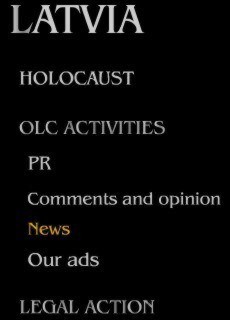VESTIENA, Latvia, March 15 (Reuters) - The glory days of the Latvian Waffen SS come alive again as Visvaldis Lacis, a sprightly grandfather with bright blue eyes, tells war stories in his little house, deep in the snow-laden Latvian countryside.
"I was so scared," says the silver-haired former platoon commander, recalling one of his first moments of combat. "But I knew I would be the first to give the order to attack. I was the Fuehrer. I did it and started running."
Veterans like Lacis are at the heart of a growing storm 120 km (75 miles) away in the capital Riga, where an annual March 16 parade commemorating the Latvian Waffen SS Volunteer Legion's fight against the Red Army has been banned.
Far-right youth groups Klubs 415 and the Union of National Force plan to march anyway and the city is braced for violence. Last year, anti-war protesters and far-right groups fought as veterans looked on. This month, Riga Mayor Aivars Aksenoks warned of possible unspecified "terror acts," although Prime Minister Aigars Kalvitis said the mayor's statement was rash.
The march exposes the sensitive position of Latvia, newly part of the European Union but still overshadowed by its former ruler and neighbour Russia. Latvian men fought on both the Nazi German and Russian sides in World War Two.
Russia has described the parades as a glorification of war criminals and said they undermine the EU's moral authority. Such criticism finds its mark at a time when Brussels is trying to entice Balkan governments to hand over war criminals as a carrot for eventual EU membership.
The Latvian government, which won its independence from Moscow in 1991, has rejected accusations that the parade is fascist. But its attitude to the march has been uneasy, shifting from open support in the past to a ban on official attendance.
"March 16 was sanctioned by the government but then was taken away as an official day of commemoration," said Foreign Minister Artis Pabriks. "We're caught in between appearing good to the West and accusations from Moscow."
GREETED WITH FLOWERS
Many Latvians see the veterans who fought the Russians as part of Hitler's infantry elite, the Waffen SS, as heroes. They say the veterans had no connection with atrocities, such as the mass murder of some 70,000 Latvian Jews during the war.
"They are patriots. There needs to be an understanding of the dilemma they faced," says Gundega Michel, director of the Occupation Museum of Latvia.
She says many Latvians, thinking their pre-war republic would be restored, greeted the Germans with flowers when their forces pushed out the Russians and arrived in Riga in July 1941.
"Thousands and thousands who desperately wanted to restore Latvia's independence were faced with serving in the Red Army or in the Waffen SS," she says. Many chose the lesser of two evils, with Latvians horrified after a year of Russian rule, she said.
"That year was called the Year of Terror and it ended with the first mass deportations of men, women and children and people being shot and tortured," she said.
Critics of this view say that while about 20,000 people in 1940 were transported or killed by the Russians, some 70,000 Jews were slaughtered a year or so later with some Latvians taking active part in the massacres.
"Up to a quarter of the Latvian legion were volunteers," says Efraim Zuroff, head of the Simon Wiesenthal Center's office in Israel.
"My problem is that many of them were cold-blooded killers of Jews who went on to volunteer for the legion when it was formed in 1943," he says. "Latvia lacks heroes and it is a tragedy for the new Latvia that they picked the wrong ones."
Dr Stephen Weiss, a World War Two veteran and lecturer at the War Studies Department at King's College London, dismisses claims the Latvian soldiers were patriots.
"I can't get over how little we've learned in 60 years. Many might claim patriotism, but ideology drove them," he said.
Adding to the tension is Latvia's large Russian-speaking minority, many of whom see the veterans as traitors or worse.
Elvira Ilyahina was taken to Salaspils concentration camp outside Riga, as a girl of 11 and cannot forget her experience.
"I saw Latvian Waffen SS soldiers at the camp and Latvian soldiers there shot people," she said. "When Latvian legionnaires march on March 16 I feel bad."
Latvia's War Museum says there were two divisions of around 100,000 men, the biggest contribution of any German-occupied nation to the Waffen SS's 900,000 men.
Lacis himself survived some of the bloodiest fighting in the war until Nazi Germany capitulated in May, 1945 and Russia returned to resume an occupation of Latvia begun in 1940 and lost a year later.
"I have never met a single Latvian who called me a fascist or Nazi," he said in his cosy brick home. "How could I be a Nazi if I was never a member of the party?"
Reuters, March 15, 2006
________________________________________________________________________
| 

